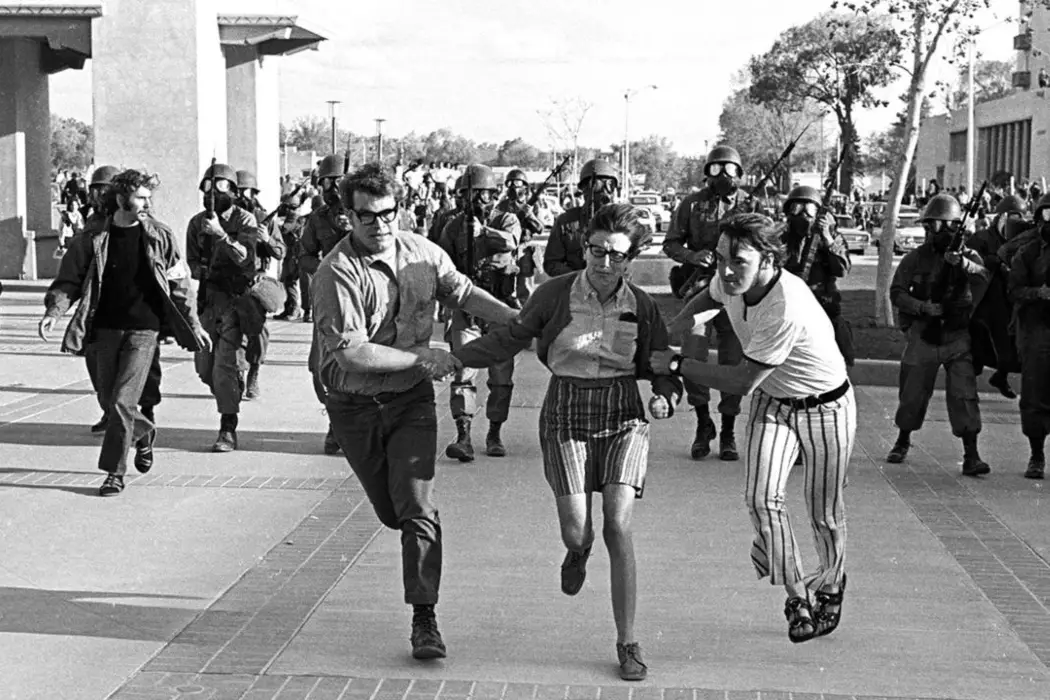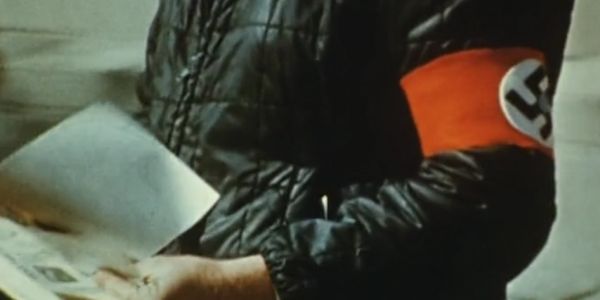A GRIN WITHOUT A CAT: Resist & Exist

Massive film lover. Whether it's classic, contemporary, foreign, domestic, art,…
Chris Marker is the best example of a self-made and self-styled auteur whose sole vision is entirely of his own making. Even his best-known works, the time-traveling photo-film short La Jette, or the free-flowing travelogue, part essay documentary Sans Soliel defy categorization or simplistic explanation. Marker‘s ethereal presence permeates his work (and even his enigmatic persona), giving the various fleeting moments of his work an expanse of existential potency, giving us a way to see ideas, feel sounds and experience the thoughts of an icily reassuring unknown narrator. The inquisitive and curious viewpoint makes these artful sojourns into nothing and everything so rich, so what about the tumult and urgency of decades of political upheaval, revolutions, secret wars, government intervention, colonialization, rebellions, coups, and various occupations around the world?
A League of His Own – The Vision of Chris Marker
It turns out that his two-part docu-essay feature (once again, his work so easily eschews categorization) A Grin Without a Cat is a potently poetic diatribe regarding political fervor, social upheaval, and oppression of all kinds. It’s a broad canvass, and Marker deftly weaves the pivotal opening scenes from Potemkin into the features pronouncement, setting the tonal atmosphere with a subtly declarative assertion. There’s a recognizably icy voiceover (not unlike Sans Soliel’s narration) recalling the maggot-ridden meat that incites the downtrodden mates to rebel, the bifurcation of fact and fiction within politics, history, and film. Potemkin is all the above. The first installment, “Fragile Hands,” erupts with protests from around the world juxtaposed with scenes from Potemkin, fists raised in defiance, people clobbered in the streets by fascistic law enforcement, military police in full clad armor evoking a stormtrooper-esque veneer setting upon masses of people both terrified and combative. It’s a multi-media montage, a vision of a world in disarray; this is the third world war, and Marker‘s post-Berlin Wall epilogue added in 1992 after the film was released in 1977, and now, with a new release feels like there’s more relevance in the film given recent events.
Resist & Exist. Revolution as Montage
There’s a splashing quality to A Grin Without a Cat. Marker‘s brilliant interplay of imagery conjures up both incendiary emotions as distressing, upsetting, and playful at times in how mind-numbing the machinations of warfare can be. The film might feel like it’s gobbling up a lengthy all-enveloping narrative, but it’s focused (mainly) on the sixties and seventies, the various student movements worldwide (France, US, and Japan especially), revolutions, and protests. And it’s ambitious in scope; it’s loose, unpredictable. Marker doesn’t let us ease into respite, but more of a hypnotic drone of warbling fascination.

It moves with a crackling pace that’s marginally less dreamy than the somnambulant beauty of Sans Soleil. A Grin Without a Cat has an anarchic poise and possesses an elevated sense of intelligent irony in its ironic editing and posturing of images. Drifting from verite footage of demonstrations to interviews with various figures, whether they be pundits for the Communist/Marxist party, Pappy Sheldon (who trained Bolivian troops to capture Che Guevera), archival footage of Fidel Castro, Che Guevera, (among many) some of these faces and names might skate over the heads of some more younger audiences/viewers. Still, it’s not required to understanding the material; Marker shapes the intricacies of political turmoil in a meditative and palatable form without dumbing down the material.
Political Art, Artful Politics
It’s a rarity when there’s politically volatile footage assembled into a documentary (of sorts) with violent, uncompromising images and scenes; it is hard-hitting. Yet, Marker‘s style isn’t didactic or preachy. He doesn’t cut away, use any structural cop-outs, A Grin Without a Cat leans in and is still an inquisitive movie; it’s not sure what to make of the madness that’s ingrained so deeply in our worlds cultural miasma, but it’s encouraging us to think about it, and that’s one of the signs of a sustainable screen artist, one who gets us to think about the past, while we try to make some sense of the present.
There are links to a modicum of world events through the film, Vietnam, Kent State, Prague Spring, Minamata, the Bolivia Campaign, (among many, many more) and it ignites a charge of intelligent vitality; we’re confronted with images and scenes that aren’t easy. White supremacists replete with swastika armbands chanting “bomb Hanoi” arguing for the remigration of black people to Africa, an exhibition, “just like a Motorshow” showing off tactical/military goods, IED’s, Bangalore torpedoes, donut charges, pipe bombs, shape charge, and soap dishes. Varieties of modified explosives that we often associate as the makings of fringe groups and terrorists, when in fact, it’s being taught from America’s military intelligence. Every so often, re relish in grotesque and gorgeous images of protests, parades where people masquerading as giant cats, dueling and playing instruments, it’s surreal in way that recalls Lewis Carroll by way of a lysergic rebellious observer.

Maybe it’s Marker‘s high-concept, high-tourist, high-art approach is dreamy and grating as his quizzical feature jumps from impressionistic essay to allusive documentary, this-worldly perspective gives dynamic and range unlike anything else that grazes the many subjects featured throughout both entries of A Grin Without a Cat.
Where to Stream
Icarus Films has a remastered version of A Grin Without a Cat showing for the first time in North America on OVID streaming rental. While the film is wonderful to have and see in North America since much of the movie comprises archival footage and grainy 16mm, it can only look so good. Icarus films don’t compromise the quality is all for the better. There are multiple versions, and much of the English language narration is intact (it veers from French to English) and the embedded subtitles. Sometimes the narration is hard to decipher, and supplementary captions would have been a nice bonus, but it might also muddle the image given the embedded, pre-existing translation(s). However the restoration shows respect to Marker’s vision, the feature looks handsome without compromising its original look and feel, thankfully, Marker’s vision is intact.
The Artful Touch?
There’s something to be said for Chris Marker and the aesthetic richness of A Grin Without a Cat, unlike the muckraking politicizing that’s common in more fare (Enemies of the State) or the glut of streaming fare we see on Hulu and Netflix. However, you have more artful and interpretive documentarians like Alex Gibney, David Gregory, or Rodney Ascher, (whose singular voice is one of the most innovative creative forces working in the medium) does it seem like there’s some influence there?
Have you see A Grin Without A Cat? What did you think? Let us know in the comments below!
Watch A Grin Without A Cat
Does content like this matter to you?
Become a Member and support film journalism. Unlock access to all of Film Inquiry`s great articles. Join a community of like-minded readers who are passionate about cinema - get access to our private members Network, give back to independent filmmakers, and more.
Massive film lover. Whether it's classic, contemporary, foreign, domestic, art, or entertainment; movies of every kind have something to say. And there is something to say about every movie.













